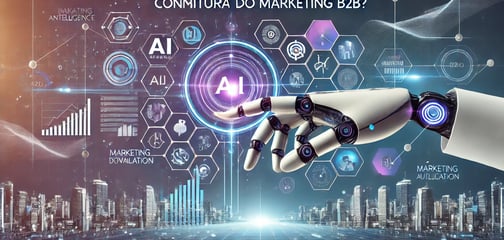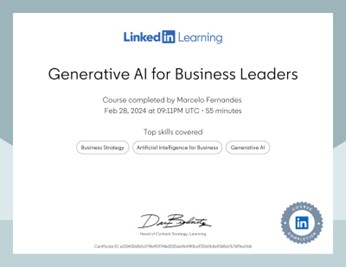How will Artificial Intelligence contribute to the future of B2B Marketing?
B2B (business-to-business) marketing is an area that, despite being essential for generating revenue and growing companies, faces significant challenges due to the complexity and multiplicity of processes involved.
MARKETING


Automation of Repetitive Tasks in B2B Marketing Using Artificial Intelligence
B2B (business-to-business) marketing is an area that, despite being essential for generating revenue and growing companies, faces significant challenges due to the complexity and multiplicity of processes involved.
From content creation to campaign coordination and data analysis, many of the daily activities of B2B marketers are repetitive and time-consuming. In this scenario, technology, and in particular Artificial Intelligence (AI), emerges as a powerful ally to optimize and automate these tasks, providing greater efficiency and strategic focus.
The Complexity of B2B Marketing
One of the most challenging aspects of B2B marketing is the need to deal with a vast array of processes that are often not effectively integrated.
Unlike B2C (business-to-consumer) marketing, where companies focus on a large number of end consumers, B2B marketing involves a more complex chain of decisions, with multiple stakeholders, prolonged negotiations and, often, long sales cycles.
Additionally, many B2B companies fail to unify their marketing processes around common goals. This is largely because the different marketing and sales channels — such as email marketing, social media, events, direct sales, and others — often operate in a fragmented manner.
When these processes are not optimized and coordinated, efficiency and results can suffer.


The Role of Technology in B2B Marketing
Technology has the potential to be a significant amplifier of human capabilities, allowing marketers to dedicate their time to more strategic tasks while AI takes care of the repetitive activities.
Examples of how technology can improve performance include:
Automating Repetitive Processes : Marketing automation tools can take care of tasks such as segmenting leads, sending personalized emails, and tracking customer interactions. These activities can be performed autonomously, without constant intervention from the marketing team.
Real-Time Data Analysis : The volume of data generated by B2B campaigns can be enormous. AI allows you to analyze this data in real time, providing immediate insights into consumer behavior, identifying patterns, and adjusting strategies as needed.
Personalization at Scale : While personalization is key to successful B2B marketing, creating content tailored to each lead can be challenging. AI can help automate the process of creating personalized content based on lead behavior and preferences, optimizing engagement at scale.
Chatbots and Automated Service : Using AI-powered chatbots in customer service allows you to answer common questions, qualify leads, and even schedule meetings in an automated way, reducing the workload of the sales and marketing team.
Challenges of Implementing AI in B2B Marketing
Despite its numerous advantages, adopting AI in B2B marketing is not without its challenges.
Some barriers can make it difficult to implement technological solutions, such as:
Resistance to Change : Many organizations can be resistant to adopting new technologies, especially when there is a reliance on traditional manual processes. Cultural change within the company is often one of the biggest obstacles to overcome.
Complexity in Systems Integration : Integrating AI with legacy systems can be challenging. Many B2B companies operate with disparate platforms for CRM, marketing automation, e-commerce, and other systems, which can create challenges in centralizing and analyzing data.
Lack of Quality Data : AI relies on quality data to provide accurate insights. Many companies struggle to collect, organize, and ensure the quality of data needed to train AI algorithms. Without adequate data, the effectiveness of AI tools can be compromised.
Training and Capability : Successfully implementing AI requires marketers to have the skills to work with these tools. A lack of training in emerging technologies can limit the potential for AI adoption in businesses.
Initial Implementation Cost : Adopting AI can require a considerable upfront investment in infrastructure and training. While the return on investment (ROI) is positive in the long run, many companies may be hesitant to make this initial outlay.
How to Overcome the Challenges and Maximize the Benefits of AI in B2B Marketing
While the challenges are clear, there are approaches companies can take to ease the transition and make the most of AI tools in B2B marketing:
Strategic Planning : Before adopting an AI tool, it is crucial that a company has a clear vision of how it wants to improve its marketing processes. Setting clear goals and KPIs is the first step to ensuring the success of the implementation.
Continuous Training : Investing in training programs for marketing and sales teams can help overcome the barrier of lack of knowledge. The more prepared professionals are, the more effective the use of technology will be.
Start Small and Scale : You don’t need to adopt AI solutions for every area of your marketing at once. Starting with pilot projects, such as email automation or implementing chatbots, allows you to test the benefits and fine-tune your strategies before implementing them on a larger scale.
Partner with Technology Providers : Companies that don’t have in-house AI expertise can seek out partners who specialize in AI-based marketing solutions. Consultants and technology providers can help make the transition smoother and more effective.
Conclusion: Benefits and Final Considerations
Artificial Intelligence offers a unique opportunity to optimize and transform B2B marketing. However, its implementation requires care and strategic planning.
Below, we highlight the main points that B2B marketers should consider when adopting AI:
Reduction of repetitive tasks and increased productivity.
Improve personalization at scale, creating more relevant experiences for leads.
Real-time data analysis for faster, more accurate decision making.
Challenges in terms of integration, resistance to change and enablement that need to be overcome to ensure successful adoption.
Initial investment required, but with long-term returns if implemented well.
The future of B2B marketing is increasingly linked to technology and intelligent automation.
Companies that know how to efficiently integrate AI into their processes will be able to not only increase their operational efficiency, but also significantly improve the customer experience and the results of their campaigns.
Ultimately, Artificial Intelligence tools are amplifiers of human capacity and their correct use can bring significant gains for the professionals involved.
See more articles
Featured Articles
Continue reading about B2B marketing


